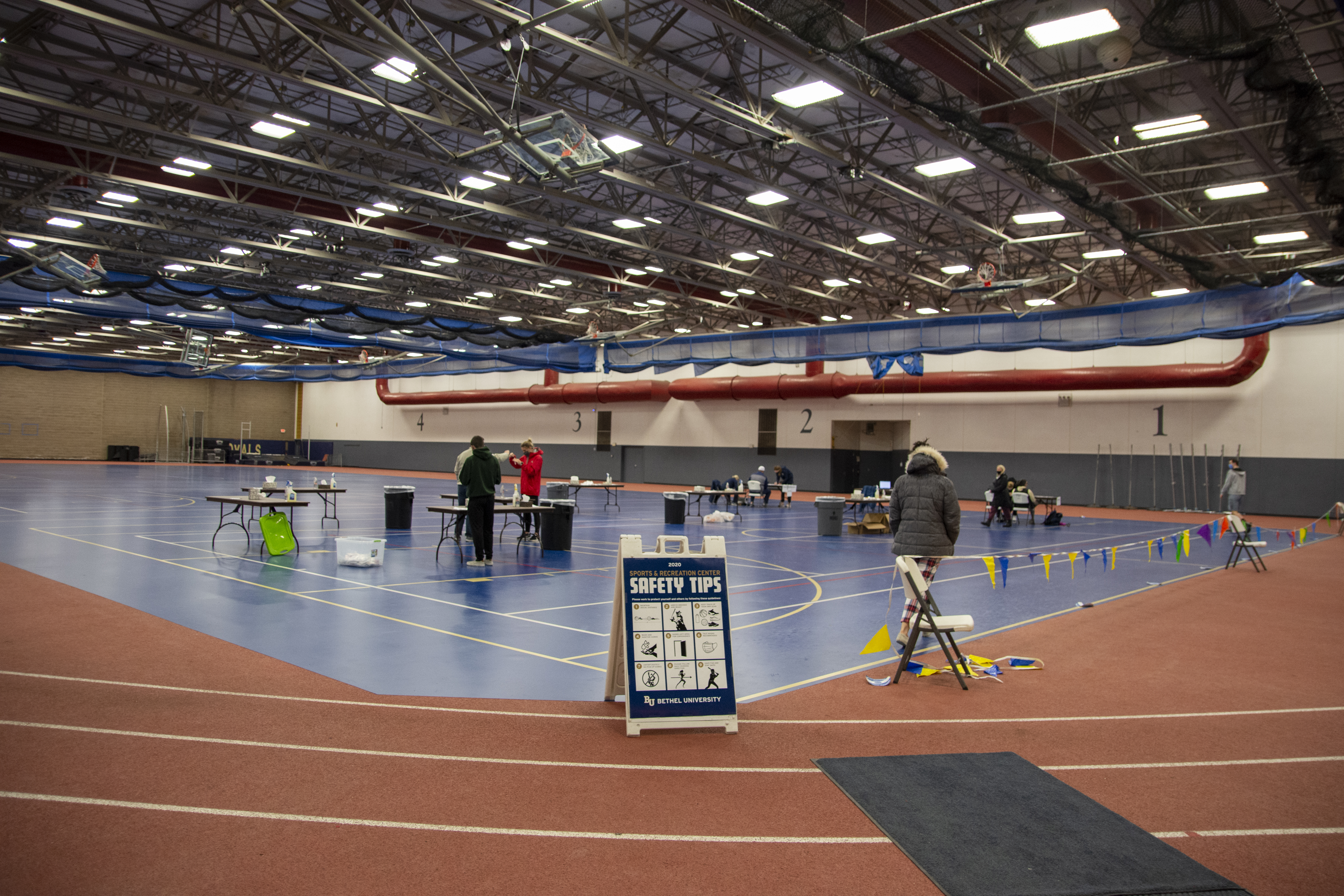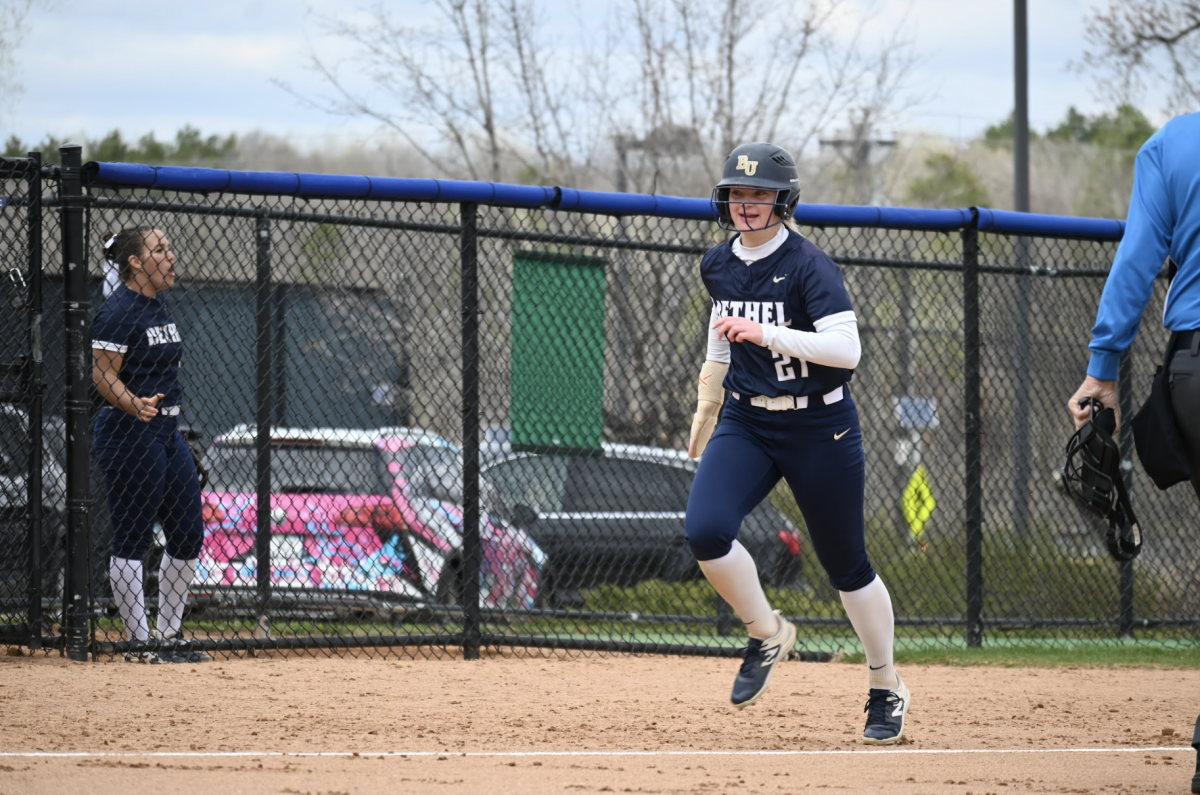Bethel spring sports are back in action with intense COVID-19-related protocols after a disappointing cancellation in 2020.
By Caden Christiansen | Contributing Writer
As snow begins to clear off of Hargis Park and the Ona Orth Athletic Complex, Bethel University spring sports are back after a calendar year filled with frustration and disappointment for many athletes. The COVID-19 pandemic wiped out the 2020 season for spring sports athletes, but the familiar ping of metal bats, shoes digging into the track, and swish of tennis rackets brings excitement to campus.
Still, everything is not exactly the same as it was before last March. Bethel athletes will have to deal with several new protocols amidst the ongoing pandemic, not to mention only having some, if any, fans during competition. The Minnesota Intercollegiate Athletic Conference (MIAC) has provided extensive guidelines for teams to follow and ensure the health and safety of players and coaches during the season. Because outdoor spring sports have a lower risk of COVID-19 spread, the MIAC has decided to follow the NCAA testing and masking guidelines, but has left the specificity of protocols and fan attendance up to the discretion of each individual university.
Bethel has announced they will welcome spectators to outdoor, on campus sporting events for baseball and softball games along with tennis matches. Each student athlete and coach will be allotted three tickets for fans, and softball and baseball will welcome 30 visiting spectators while tennis will welcome 20 visiting spectators.
“Each campus is a little different based on how they are handling COVID-19 from a campus wide standpoint,” said Bethel professor and director of athletic training services Justin Byers. “We have chosen to follow, as close as we possibly can, the NCAA recommendations and requirements and the CDC and Minnesota Department of Health guidelines.”
All MIAC schools are abiding by conference-wide guidelines that require masks to be worn during both practices and competition, along with team testing guidelines that require athletes to PCR test for COVID-19 every week.
How other MIAC schools supply these tests to athletes and whether they meet the testing guidelines or exceed them is up to the discretion of each university. Bethel has been fortunate to work with Hyvee Food Stores, which provides the university with free testing kits for all of its student athletes.
“We were really lucky to find out that relationship with Hyvee,” Byers said.
The relationship with the company began through a former Bethel student who works as an athletic trainer at another Twin Cities school and was able to give insight into the testing program Hyvee provides.
“We reached out to Hyvee to see if it was possible to have that testing with us, and we were lucky enough to be one of the last few schools to get into the free testing that Hyvee was doing,” Byers said.
The Hyvee testing program is run through federal grants on a monthly basis, and as long as they are receiving federal funding, Bethel athletes will be able to get tested throughout the spring sports season. Testing is conducted from 7:30 a.m. to 8:10 a.m. and is communicated to athletes on a weekly basis. The free testing has allowed Bethel athletes to test at least once a week, but how often each team must test is based on NCAA recommendations.
“None of the spring sports are listed as high risk due to the nature of competition,” Byers said.

In terms of physical distance during competition, spring sports do not pose as high of a risk for COVID-19 exposure because of the lack of direct contact between athletes. Tennis and golf are played in a naturally distanced manner while sports such as baseball, softball, and track have the ability to take preventative measures like physical distancing in dugouts or on the racetrack that slow the spread of COVID-19.
Spring sports also have the luxury of being outside, which mitigates the spread of the virus better than indoor sports can. With less athlete-to-athlete contact, Bethel spring sports are not required to test as extensively or often as winter sports were, but still are testing for preventative and cautionary purposes.
“Basically 25 to 50 percent of the teams have to test every week as surveillance testing because the risk of them are so low,” Byers said.
Bethel baseball, softball and track teams have occupied the majority of the testing as they are listed as intermediate risk sports, requiring them to test at least once a week throughout the entirety of the season. And with a large number of athletes on each team, players and coaches are required to go through even more protocols when traveling to away games.
“For all of our traveling teams, we have to do symptom checks before they get on the bus to go,” Byers said. “We are doing temperature checks; we are doing pulse ox checks to make sure we are not missing any symptoms or the potential for positive tests.”
Trying to stay on top of the spread of COVID-19 is no easy task for the training staff when only testing athletes once or twice a week, but utilizing other measures such as checking body temperatures and blood oxygen levels via the “pulse ox” checks have proven effective in detecting COVID-19 when symptoms are not present.
“In this age bracket of 18-22 year olds, so few of them are going to exhibit symptoms even if they are positive for COVID-19, so things like temperature checks and pulse ox readings compared to their baseline readings can tell us whether or not they may be positive, even if they don’t have symptoms,” Byers said.
These protocols, along with weekly testing, have allowed the Bethel training staff to closely monitor all the spring sport athletes and the spread of COVID-19. Extensive protocols during travel, such as consistent bus seating charts and smaller traveling rosters than years past, has allowed for more efficient contact tracing and helped minimize the risk of transmission.
Despite the intense protocols that athletes are forced to abide by in order to compete in the 2021 season, seeing spring sports up and running is a sigh of relief for athletes, coaches, and fans alike.
“It’s definitely different. Wearing masks during practice, lifts and games isn’t ideal,” junior baseball player Nick Kulseth said. “But I’d rather play with a mask on than not play at all.”

![Nelson Hall Resident Director Kendall Engelke Davis looks over to see what Resident Assistant Chloe Smith paints. For her weekly 8 p.m. staff development meeting in Nelson Shack April 16, Engelke Davis held a watercolor event to relieve stress. “It’s a unique opportunity to get to really invest and be in [RAs’] lives,” Engelke Davis said, “which I consider such a privilege.”](http://thebuclarion.com/wp-content/uploads/2024/05/041624_KendallEngelkeDavis_Holland_05-1200x800.jpg)















